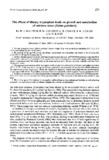The effects of dietary tryptophan levels on growth and metabolism of rainbow trout (Salmo gairdneri)
Share
စိတ္တဇ
1. Groups of rainbow trout (Salmo gairdneri) (mean weight 14 g) were given diets containing 0.8, 1.3, 2, 3, 4 or 6 g tryptophan/kg diet for 12 weeks.
2. By analysis of the growth results, the dietary requirement of tryptophan was found to be 2.5 g/kg diet (equivalent to 50 mg/kg biomass per d).
3. Carbon dioxide expired by trout following intraperitoneal injection of [14COOH]tryptophan contained little radioactivity when dietary tryptophan level was low but, above 2.0 g/kg diet, it increased rapidly with increasing dietary tryptophan level. The break point in the dose-response curve did not, however, coincide with that from the growth results.
4. Changes in concentrations of free tryptophan in blood and liver and activity of hepatic tryptophan pyrrolase (EC 1.13.11.11) in response to changes in dietary tryptophan concentration did not provide reliable indicators for quantifying dietary requirement. Unlike the situation in mammals, blood tryptophan was not protein-bound to any appreciable extent. Tryptophan pyrrolase of trout has properties which suggest it has no apoenzyme form.
5. In fish given adequate levels of tryptophan injected intraperitoneally with a tracer dose of [14COOH]tryptophan, 60% of the dose was incorporated into body protein within 1 d. The turnover of the label in this protein is very slow.
6. Those trout given diets deficient in tryptophan suffered from severe scoliosis and lordosis as well as having increased liver and kidney levels of calcium, magnesium, sodium and potassium.
Suggested Citation
Walton, M. J., Coloso, R. M., Cowey, C. B., Adron, J. W., & Knox, D. (1984). The effects of dietary tryptophan levels on growth and metabolism of rainbow trout (Salmo gairdneri). British Journal of Nutrition , 51(2), 279-287. https://doi.org/10.1079/BJN19840032
စုစည်းမှုများ စုစည်းမှုများ
- AQD Journal Articles [1249]

